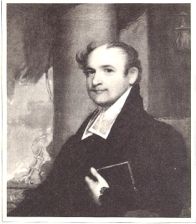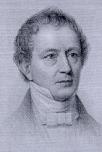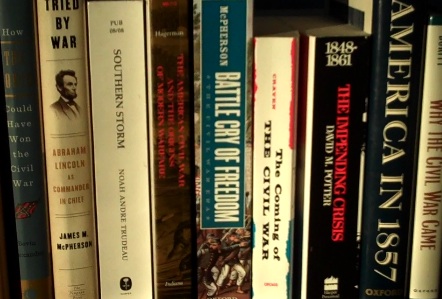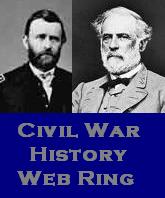Book Report: George Bancroft
I realize this won’t be for everyone but I wanted to post the academic book review I finished yesterday on the paperback version of Russel Blaine Nye’s 1945 Pulitzer Prize winning biography George Bancroft: Brahmin Rebel. Sadly this book is out-of-print and available only via library or used book markets. It is a fascinating work filled with insights into an uncommon man who was once this country’s most revered historian – but whom most of us have no memory. It also provides considerable information about our country – and indeed the world – in the period leading up to, during and after the Civil War.
It was enlightening to put this post together in that I discovered some great sources of information about many of the people, places and times in which Bancroft lived. Kudos to http://www.harvardsquarelibrary.org for their information on important persons in that university’s history.
By Russel B. Nye. New York
(Washington Square Press, Inc.). Pp. 212. 1964. $.60
If biographies written in the twenty-first century tend toward tomes, Russel Nye’s work on George Bancroft, easily the most acclaimed American historian of the nineteenth century, demonstrates how to impress with a modicum of words. Bancroft’s life spanned a period of epic change in the fledgling American nation. Nye skillfully paints a portrait of the man against the sweeping landscape of the United State’s passage from fledgling country at the turn of 18thcentury to a battle-scarred nation ninety years later. Bancroft helped to make American history as politician and statesman. He also became one of the country’s most gifted historiographers and the first popular historian, a title that was, by the end of the century, not unlike his literary writing style, considered “passé.”
George Bancroft came from a legacy of northeastern conservatism. Bred squarely into the center of the American Calvinistic farming culture of Worcester, Massachusetts, his grandfather Samuel Bancroft was both strict Calvinist and independent of mind. Bancroft’s father, Aaron Bancroft, had a noteworthy career as one of the first leaders of the Unitarian movement. This step toward liberalism directed him to the pastorship of a small Second Congregational Church of Worcester and modest means to support his growing family. But it also positioned him with the intellectual elite of New England. The Bancroft home was a place where books were plenty and reading and discussion encouraged. Independent reason was also valued. Aaron Bancroft authored one of the more popular biographies of George Washington, a man who young George Bancroft would eventually count as among the most influential hero-leaders of the country.
George stood out among his siblings and opportunities were given to him to attend preparatory school at a young age even though it caused strain on his father’s finances. He excelled and passed entrance exams to Harvard College at the  age of 13. Bancroft graduated Harvard at 17 and, with the assistance of college president John Thornton Kirkland (pictured right and papers here), w
age of 13. Bancroft graduated Harvard at 17 and, with the assistance of college president John Thornton Kirkland (pictured right and papers here), w as provided both financial support and the necessary letters of introduction to follow a select few Harvard graduates to Göttingen, one of the top universities in Germany (brief history of the town and university here). His goal was to follow his father into the ministry. He began a rigorous course of study including a self-imposed schedule of sixteen hour days. By the age of twenty, Bancroft had a Göttingen doctorate and the respect of some of Germany’s most noted professors. But he had also developed a considerable interest in philosophy, history and literature and began to doubt whether a career in the ministry remained his passion. He continued with post doctorate studies in Berlin and by the end of his four years in Europe had met many of its influential writers, artists and academics. Bancroft returned home filled with ideas about educational reform and exhibiting mannerisms and dress inspired by his time abroad.
as provided both financial support and the necessary letters of introduction to follow a select few Harvard graduates to Göttingen, one of the top universities in Germany (brief history of the town and university here). His goal was to follow his father into the ministry. He began a rigorous course of study including a self-imposed schedule of sixteen hour days. By the age of twenty, Bancroft had a Göttingen doctorate and the respect of some of Germany’s most noted professors. But he had also developed a considerable interest in philosophy, history and literature and began to doubt whether a career in the ministry remained his passion. He continued with post doctorate studies in Berlin and by the end of his four years in Europe had met many of its influential writers, artists and academics. Bancroft returned home filled with ideas about educational reform and exhibiting mannerisms and dress inspired by his time abroad.
Bancroft spent the next several years trying to find his calling. Trained in philology (the study of languages) as well as theology, he tried on the role of Greek tutor at Harvard but became frustrated with the college’s lack of interest in adopting the new educational techniques he brought from abroad. He was also unpopular as a teacher, which is not to say that he was a bad teacher; rather a demanding one. By mutual consent, he left Harvard after a year and with fellow Harvard and Göttingen graduate Joseph Cogswell, opened the Round Hill School for boys near Northampton, Massachusetts in 1823. It became a phenomenon of sorts due to the melding of the latest methods of European educational reform with those of American boarding school. “It was one of the earliest and most successful efforts of the nineteenth century to raise the level of American secondary education by absorbing the new European experimentation, and served as a powerful influence in the diffusion of new ideas on discipline, individual attention, and stimulation of student interest” (45). A student was treated as an individual with unique learning patterns and cooperated as an equal with his teacher rather than as an inferior with his master. Despite the demanding program, the elite of New England clamored to enroll their sons. With Bancroft as the primary teacher and Cogswell managing administration, the school grew in both size and reputation.
It was at Round Hill School that Bancroft met his wife, Sarah Dwight. Her status as the daughter of a wealthy New England family would ensure his financial independence. Bancroft also continued to work on his poetry (he had published Poems while at Harvard) and found opportunity for preaching. But he was successful at neither. His poetry was labeled amateurish and his oration at the pulpit “too consciously learned, too pretentiously oratorical” (5). Interestingly, Bancroft would become a gifted literary critic. A man of many interests, he became bored with the life of a country school teacher and bowed out of the venture in 1831. The Round Hill School failed three years later.
Bancroft discovered while at Round Hill a growing interest in politics. He began to write for prominent journals and even spoke in a political forum in Northampton at the behest of town leaders. In 1830 he was nominated for the Massachusetts’s senate by the Workingmen’s party. Although he declined, his voice as a political philosopher began to emerge. It was firmly centered on the premise that the will of the many outweighed that of the few, a principle that he considered foundational to democracy. He clearly identified himself as a Jacksonian democrat in 1836, a fact that surprised a number of his Whig Harvard colleague s including friend Edward Everett (pictured right). His allegiance was with the common, agrarian masses rather than the privileged minority. His political position became all the more public with Bancroft’s growing involvement in the Democratic Party. He wrote several journal articles in support of Jackson’s position on the national banking issue which he attributed to the long struggle between capitalists and laborers. In 1838, his party work was rewarded with the position of Collector of the Port of Boston. By 1844, he was a prominent player in the Massachusetts democratic delegation and played a key role in securing the Presidential nomination for
s including friend Edward Everett (pictured right). His allegiance was with the common, agrarian masses rather than the privileged minority. His political position became all the more public with Bancroft’s growing involvement in the Democratic Party. He wrote several journal articles in support of Jackson’s position on the national banking issue which he attributed to the long struggle between capitalists and laborers. In 1838, his party work was rewarded with the position of Collector of the Port of Boston. By 1844, he was a prominent player in the Massachusetts democratic delegation and played a key role in securing the Presidential nomination for  James K. Polk (pictured left). Polk appointed Bancroft Secretary of the Navy the following year and he found himself Acting Secretary of War during the months that opened the Mexican War. But Bancroft was after a diplomatic post and between 1846 and 1849 he served as United States Minister to England. It was during this time that he amassed a huge collection of historical notes from British archives, utilizing scribes and secretaries to copy copious amounts of data. These he brought home to America for use in future historical writing.
James K. Polk (pictured left). Polk appointed Bancroft Secretary of the Navy the following year and he found himself Acting Secretary of War during the months that opened the Mexican War. But Bancroft was after a diplomatic post and between 1846 and 1849 he served as United States Minister to England. It was during this time that he amassed a huge collection of historical notes from British archives, utilizing scribes and secretaries to copy copious amounts of data. These he brought home to America for use in future historical writing.
The scholar in Bancroft had found new voice shortly after leaving Round Hill. In 1834, he published the first of what would become his multi-volume treatise, A History of the United States from the Discovery of the Continent (set of all volumes to right). (A full listing of Bancroft’s works avail able online can be found here.) He chose to focus not on contemporary history but rather on the formation and evolution of the nation. Bancroft believed that the creation of the United States of America was part of a divine plan. It was a demonstration for all the world of the efficacy of a nation built on the principles of liberty.
able online can be found here.) He chose to focus not on contemporary history but rather on the formation and evolution of the nation. Bancroft believed that the creation of the United States of America was part of a divine plan. It was a demonstration for all the world of the efficacy of a nation built on the principles of liberty.
Pivotal to the country’s success was the quality of its leaders. “The secret of the science of governing, Bancroft decided, lay in the quality of a nation’s leaders – those great men who personify the people’s ideals, act out their interests, and crystallize their needs in laws and institutions” (82). Nye found that Bancroft valued two types of hero-leaders. The first was the agrarian nobleman best exemplified in Andrew Jackson (pictured below).

His gift was an innate perceptiveness gained from long connection with nature. The second was the classic wise man whose traits Bancroft found in George Washington, a man for whom he had a lifelong admiration.
Abraham Lincoln eventually became Bancroft’s third hero-leader. While initially unimpressed with Lincoln, his respect for him grew to such a degree that he eventually thought him representative of the genius of the American people. Bancroft’s regard for Lincoln was no doubt one reason that he was chosen by Congress to deliver his eulogy. It was considered his best oration.

Like the nation, Bancroft had to come to terms with slavery. He blamed the English for its introduction to the colonies and thought it a temporary evil gone array. Its conflict with the principles of liberty was always obvious. While never a flaming abolitionist, Bancroft considered slavery the primary cause of the Civil War and spoke out about it primarily in his writing. He was a resolute unionist and had little sympathy for arguments for state rights and for the succession movement.
Bancroft happily finished his diplomatic career in Germany where he became a favorite of politicians and intellectuals. He returned to a quite life, still writing and active for most of his ninety-one years. The portrait below was painted while Bancroft was in diplomatic residence in Germany.
Nye does a masterful job of identifying Bancroft’s core beliefs and the influences that formed the man and his career. He also shows a considerable grasp of the nuances of history that were in play in the 19th century, worth noting because Nye’s training is in literature rather than history. His obvious mastery of the large collection of papers Bancroft left behind for his biographers is impressive.
Nye leaves the reader with a sense for the utter brilliance of Bancroft (pictured below in his study) and yet presents him as anything but infallible. He was a man who enjoyed the privileges of an education well beyond the norm of his day and earned by an innate drive and love for scholarship. He was comfortable with life choices that went ag ainst the norm, an indication of independence of thought. He was not unfamiliar with loss, having endured the death of his young wife. He knew failure, having disappointed those who saw in him potential as minister. His failure as a poet, a personal aspiration, revealed a level of sensitivity (He worked very hard to find and destroy every copy of his Poems.). He embraced cultures and perspectives outside of his own and yet remained an American patriot. He brought to his generation a better sense of the story of their country and to a large degree, popularized history. He remained a loud voice for the ideals of liberty and democracy and the rights and privileges of the masses. But at his core, he was, as depicted by Nye, a man of letters and I suspect that Mr. Bancroft would be pleased with that distinction. His legacy is a remarkable body of work sadly forgotten by most citizens of the 21st century.
ainst the norm, an indication of independence of thought. He was not unfamiliar with loss, having endured the death of his young wife. He knew failure, having disappointed those who saw in him potential as minister. His failure as a poet, a personal aspiration, revealed a level of sensitivity (He worked very hard to find and destroy every copy of his Poems.). He embraced cultures and perspectives outside of his own and yet remained an American patriot. He brought to his generation a better sense of the story of their country and to a large degree, popularized history. He remained a loud voice for the ideals of liberty and democracy and the rights and privileges of the masses. But at his core, he was, as depicted by Nye, a man of letters and I suspect that Mr. Bancroft would be pleased with that distinction. His legacy is a remarkable body of work sadly forgotten by most citizens of the 21st century.
American Military University
Rene Tyree


















































Nice Job! I hope you got an A+
I am related to George Bancroft and I too like to write, but I got zero fame:{
Kendall Bancroft Somerby
May 1, 2008 at 11:41 am
Hey Kendall. Thatks for stopping by. Seriously, you’re related to G.B. Very cool! I’d love to have his library!
Rene
Rene Tyree
May 2, 2008 at 7:26 pm
Yes, I am related to him, he was my Father’s great Uncle……..
I too wish I had his library, but sadly the only thing I have are some books of his my father bought while in art school. The books don’t seem to have much value but I am glad to have them. I know recently they just did some reprints of some of his books.
Kendall Bancroft Somerby
September 2, 2008 at 10:44 am
I’m related to Russell B. Nye – his grandniece, and I’m really glad to read a review of his book – I’ve never read it, but have always wondered about it. I do have a signed copy of his small book about Michigan. I remember most about Uncle “Bill” as we called him was his coming over to my grandfather’s home (his brother) in E. Lansing on Sundays for coffee and donuts and he and my dad and my grandfather would talk and talk about, well, I suppose politics and the world. I was only 5 or 6 or so at the time, so I don’t really remember the conversation. But I do remember him. Thanks!
Sue
Sue Erlewine
February 21, 2009 at 8:52 pm
Sue,
Wonderful to hear from you and what a terrific story about your Uncle Bill. His work on George Bancroft is really extremely good as evidence by the Pulitzer he earned for it. I highly recommend it. Having read your uncle’s book and others about Bancroft, I can understand why he found the man so fascinating.
Thanks for stopping by Wig Wags Blog.
Kind regards,
Rene
Rene Tyree
February 21, 2009 at 10:48 pm